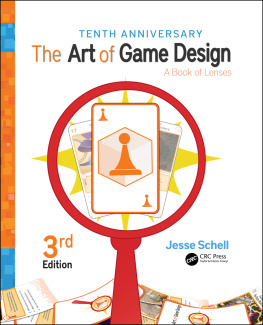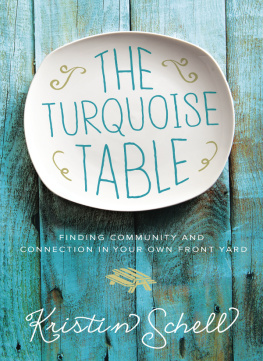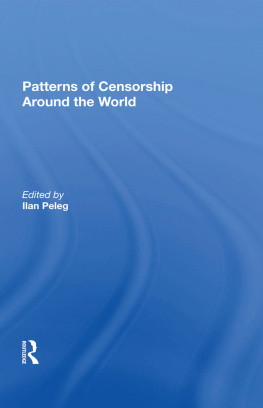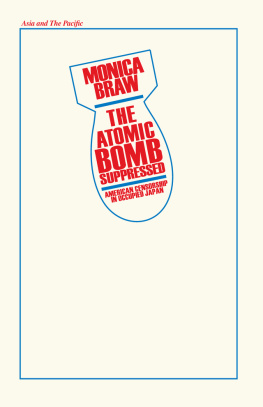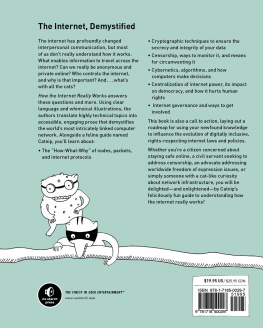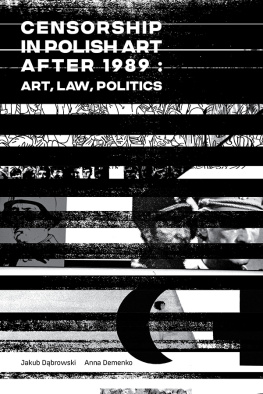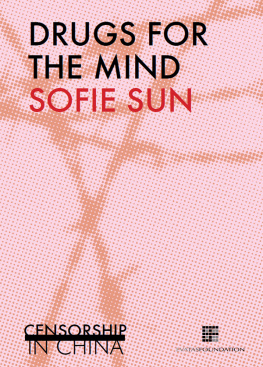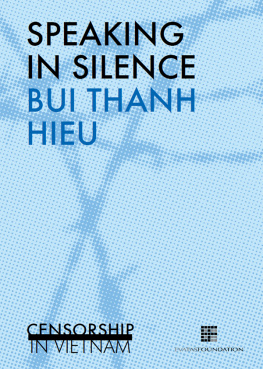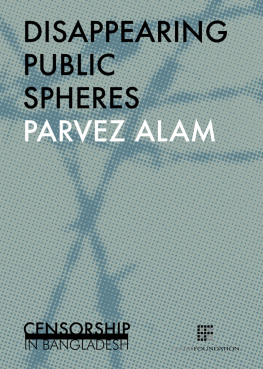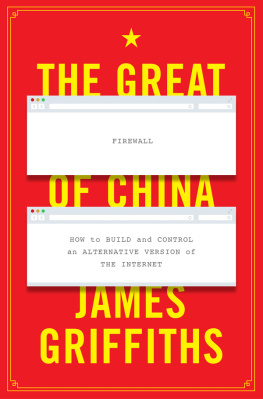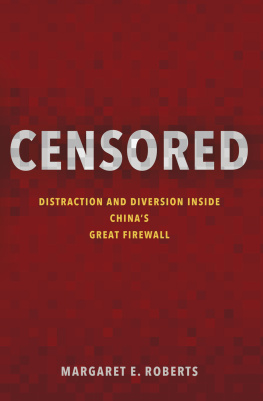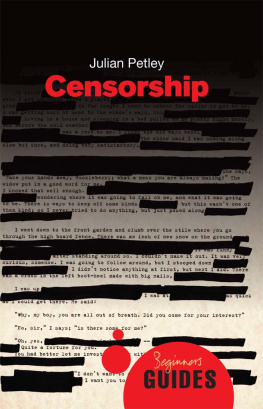Internet Censorship
A Reference Handbook
Bernadette H. Schell

Copyright 2014 by ABC-CLIO, LLC
All rights reserved. No part of this publication may be reproduced, stored in a retrieval system, or transmitted, in any form or by any means, electronic, mechanical, photocopying, recording, or otherwise, except for the inclusion of brief quotations in a review, without prior permission in writing from the publisher.
Library of Congress Cataloging-in-Publication Data
Schell, Bernadette H. (Bernadette Hlubik), 1952
Internet censorship : a reference handbook / Bernadette H. Schell
pages cm. (Contemporary world issues)
Includes bibliographical references and index.
ISBN 9781610694810 (hardback) ISBN 9781610694827 (ebook) 1. InternetCensorship. 2. InternetAccess control. 3. InternetGovernment policy. 4. CyberspaceGovernment policy. 5. InternetLaw and legislationUnited States. 6. Freedom of information. 7. CyberspaceSocial aspects. 8. InternetSocial aspects. I. Title.
ZA4201.S34 2014
004.678dc23 2014005277
ISBN: 9781610694810
EISBN: 9781610694827
18 17 16 15 14 1 2 3 4 5
This book is also available on the World Wide Web as an eBook.
Visit www.abc-clio.com for details.
ABC-CLIO, LLC
130 Cremona Drive, P.O. Box 1911
Santa Barbara, California 93116-1911
This book is printed on acid-free paper 
Manufactured in the United States of America
Recent Titles in the Contemporary World Issues Series
Child Soldiers: A Reference Handbook
David M. Rosen
Medical Tourism: A Reference Handbook
Kathy Stolley and Stephanie Watson
Women and Crime: A Reference Handbook
Judith A. Warner
World Sports: A Reference Handbook
Maylon Hanold
Entertainment Industry: A Reference Handbook
Michael J. Haupert
World Energy Crisis: A Reference Handbook
David E. Newton
Military Robots and Drones: A Reference Handbook
Paul J. Springer
Marijuana: A Reference Handbook
David E. Newton
Religious Nationalism: A Reference Handbook
Atalia Omer and Jason A. Springs
Rising Costs of Higher Education, The: A Reference Handbook
John R. Thelin
Vaccination Controversies: A Reference Handbook
David E. Newton
The Animal Experimentation Debate: A Reference Handbook
David E. Newton
About the Series
Books in the Contemporary World Issues series address vital issues in todays society such as genetic engineering, pollution, and biodiversity. Written by professional writers, scholars, and nonacademic experts, these books are authoritative, clearly written, up-to-date, and objective. They provide a good starting point for research by high school and college students, scholars, and general readers as well as by legislators, business-people, activists, and others.
Each book, carefully organized and easy to use, contains an overview of the subject, a detailed chronology, biographical sketches, facts and data and/or documents and other primary source material, a forum of authoritative perspective essays, annotated lists of print and nonprint resources, and an index.
Readers of books in the Contemporary World Issues series will find the information they need in order to have a better understanding of the social, political, environmental, and economic issues facing the world today.
Contents
, Thomas J. Holt
, Michael Johns
, Michael Bachmann
, Dorothy E. Denning
, Alanda D. Theriault
Preface
This book takes a novel approach to the presentation and understanding of a controversial topic in society: Internet censorship. When mainstream society heard about the Internet in the earlier stages of its development, there was much jubilation, because this Information Superhighway was supposedly created to help citizens around the world to have fast access to nearly an endless amount of informationwithout leaving their homes and just by clicking the mouse on their computers.
However, in recent times, there has been growing concern expressed by individuals in the online global society about Internet censorshipwhereby governments are increasingly trying to control citizens online activities, restrict the free flow of information, and infringe on the rights of online users. Stated simply, the battle over maintaining Internet freedom is heating up. Moreover, the methods used to control Internet content by governments are also becoming increasingly sophisticated. At a time when about a third of the worlds people are actively engaged online, tactics previously employed by extremely repressive regimes are now being employed by governments once considered to be more open and supportive of Internet freedom. Some of these tactics involve causing premeditated connection disruptions or paying professional commentators to consciously manipulate online discussions.
There is little doubt that most countries restrict access to content on the Internet at some basic level, such as restricting access to Web pages with offensive content or preventing children from viewing content that could result in psychological or physical harm. According to Reporters Without Borders, an organization formed to promote free expression and the global safety of journalists who are committed to freedom of information, some countries such as Belarus, China, Cuba, Egypt, and Iran have very strong censorship policies, while other countries like the United States and Estonia are quite open to the concept of freedom of information.
This book explores the various levels of Internet censorship, from the usage of Web filters to national policies or laws aimed at preventing the flow of information. Also, two sides of the controversy over Internet censorship are explored in depth. First, there are those who believe that some amount or considerable amounts of censorship are acceptable. Second, there are those who believe in and actively play the role of information freedom fighterwith some being more credible in societys eyes than others.
This book has seven chapters, containing the following points of interest. provides basic background and history on what is meant by Internet censorship, broadly speaking. The chapter opens with an interesting discussion on censorship versus national securityand why there will never be total freedom of the press or a total lack of press and Internet censorship. The discussion then moves to the controversies around adequate information release by governments versus Internet censorship, with a focus on the present-day headline-making cases of WikiLeaks, Private Manning, and Edward Snowden. The main differences between the Internet and intranets are then described. The remainder of the chapter details the growth of the Internet in the United Statesfrom its rather humble beginning to its rapid growth in the 1990s and beyond. The chapter closes with present-day concerns about Internet censorship.
of information is the foundation of any democracy, yet almost half of the worlds population is still denied it. The discussion then moves to a more fulsome exploration of the countries generally having strong censorship laws and policiesand why they can justify doing socompared to those countries advocating for a more open system of information sharing and disclosure, such as the United States and Estonia. Next, the discussion covers the important concept of cultural and legal jurisdictional factors influencing the digital divide, with a particular emphasis on criminal liability on the coincidence of four key elements. The chapter closes with a review of global trends in Internet censorship, with a summary of expert opinions on the factors that may be involved in the next phase of the Internets evolution in terms of equalizing rather than emphasizing a universal digital divide.



